Want to Build an AI Property Valuation Software?
We’ve got 2 decades of expertise in real estate and SaaS development. Trust your project to Ascendix professionals.
The landscape of real estate appraisal is undergoing a profound transformation, transitioning from traditional manual methods to the integration of advanced AI property valuation software. With manual valuations requiring extensive data analysis, in-person property assessments, and meticulous documentation, the integration of AI is streamlining these once labor-intensive tasks.
Property valuation is an essential process in real estate, offering buyers, sellers, and investors an estimate of a property’s value. It usually takes place at the very beginning of the property sale.
The person responsible – the appraiser – visits the property, estimates its physical condition, collects and analyzes other relevant data, and concludes the process by summarizing the estimated worth of the house or a flat.
While the task itself seems pretty straightforward, in reality appraisers face various challenges and constraints when establishing precise property worth.
Luckily, with the ever-evolving appraisal technology coming in place, and the AI playing a pivotal role in it, real estate property valuations are now getting faster as well as more accurate and cost efficient.
AI property valuation saves both the time of appraisers, and resources of the company. More than that, with AI real estate appraisal by your side, there is a possibility to avoid many human-made errors, compliance issues, and to enhance customer satisfaction.
AI property valuation is the use of machine learning and automated valuation models (AVMs) to let real estate appraisers analyze large amounts of data and arrive at accurate property values much faster and more cost-effectively than manual processes.
Automated valuation models represent the first iteration of AI appraisal. Automated Valuation Models are computer algorithms used to estimate the value of a property. The models gather data from various sources, including public records, property listings, and recent sales data, analyze and compare it, and calculate the estimated value of the property.
AVMs are often used by appraisers as a starting point for property valuation, later combining human expertise with the data provided by the model to arrive at a more accurate assessment of a property’s worth.
When combined with AI and machine learning, AVMs go beyond static data points. They begin to discern patterns, predict market fluctuations, assess risks, check compliance, and adjust valuations based on nuanced factors, such as future infrastructure developments or anticipated shifts in neighborhood demographics. For instance, an AVM enhanced with AI might adjust a property’s value based on upcoming urban developments or anticipated transport links.
AI technology revolutionizes the daily workflow of appraisers, offering a host of benefits that promise to streamline and enhance the appraisal process. By automating data collection from diverse sources and enabling rapid data aggregation, AI appraisal simplifies the task of information gathering, allowing appraisers to focus more on critical analysis and decision-making.
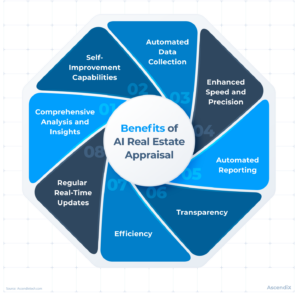
Additionally, AI’s capacity for self-improvement with machine learning technology, based on feedback and corrections from appraisers, contributes to continuous refinement and the delivery of increasingly accurate and dependable valuations.
Here we have gathered the major benefits of AI property valuation.
At the end of the day, the ultimate benefits offered by AI valuation tools, as well as the drawbacks associated with imprecise manual or half-automated appraisals, create a widening efficiency gap between traditional and AI-based property valuations.
| Manual Property Valuation | AI Property Valuation |
|---|---|
| Slow and long-lasting | Fast and automatic |
| Requires human presence | Done by technology |
| May be biased | Objective |
| Complex paperwork is done manually | Automated reports |
| Effort-consuming market and sales analysis | AI-powered analysis of data |
| Non-standard | Standardized |
| Takes into account unique features | Disregards unique property features |
So, we have talked a lot about why AI real estate appraisal will transform the industry. Let’s now delve into more detail of how this is going to happen. The entire process of AI-driven property appraisal is akin to a meticulously choreographed dance, where each step is crucial to the beauty of the final performance. Here’s how it unfolds:
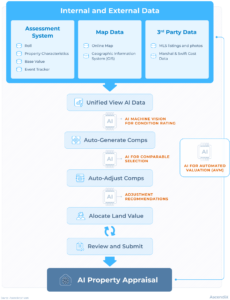
Features of AI Real Estate Appraisal Software
1. Data Collection:
Data is sourced from a multitude of channels, from public property records and real estate websites to geospatial databases and social media platforms. Given the sheer volume and varied update frequencies of these sources, a combination of real-time and batch ingestion mechanisms is employed. For datasets that don’t change frequently, like historical sales records, batch ingestion proves more efficient, collecting data in scheduled, sizable chunks.
2. Data Storage:
Once ingested, data finds its home in data lakes. These highly scalable storage solutions store vast amounts of raw data in its native format, be it structured MLS listings, unstructured aerial photos, or semi-structured property descriptions from real estate sites. Their versatility ensures a centralized, comprehensive data repository that can meet the multifaceted demands of property appraisal.
3. Data Cleaning and Processing:
Not all data is immediately usable. There might be missing values, outliers, or inconsistencies. Pre-processing of data ensures it is structured and standardized, leading to accurate analysis further. For instance, disparate date formats might be unified, data entry errors are found, or extreme property values are identified and rectified.
4. Feature Engineering:
This is the art of extracting meaningful attributes or ‘features’ from raw data. Sophisticated techniques might even involve creating interaction terms, like combining property size and age to gauge wear-and-tear. AI property appraisal software may use feature engineering to adjust the machine learning algorithms for more accurate valuation results.
5. Model Selection and Training:
With our data ready, it’s time to choose an appropriate algorithm. The choice depends on the appraiser’s aim and data’s characteristics. Based on these, the appropriate machine learning algorithm is chosen, and the training of the technology begins. The training involves feeding our data to the chosen algorithm, allowing it to ‘learn’ and adjust its internal parameters for optimal predictions.
6. Model Evaluation:
No model is perfect right off the bat. Evaluation metrics and additional analysis might be employed to gauge the model’s accuracy and reliability. Various techniques, like cross-validation, where data is split into multiple subsets to test the model’s performance, ensure robustness, and increase the efficiency of the training.
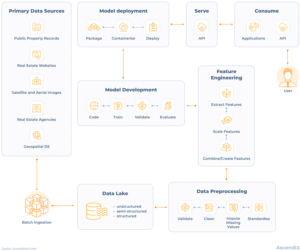
AI Property Valuation Process
7. Real-Time Data Integration:
The world is dynamic, and so is the real estate market. After the initial training, the AI model is constantly provided with real-time data. Whether it’s a sudden surge in property sales in a particular neighborhood or a new school’s impact on local house prices, AI models react and adapt, ensuring valuations remain current and accurate.
8. Continuous Learning and Model Adjustments:
As new data flows in, potential discrepancies between the model’s predictions and actual outcomes are noted and used for further training and improvement. These ‘errors’ are invaluable and guide subsequent model refinements, ensuring it evolves with changing market dynamics.
9. Property Valuation and Insights Generation:
With everything in place, the adapted, up-to-date, and refined model can now generate property valuations. But it doesn’t stop at mere price tags. It provides insights – reasons behind a particular valuation, factors contributing most to a property’s worth, or even predictions about future price movements based on current trends.

AI Property Valuation Interface | Ascendix
This workflow encapsulates the major steps of AI-driven real estate evaluations. Each stage, from raw data collection to the generation of reports and insights, is an enhanced combination of technological advancement and industry expertise. As a result, the appraiser receives accurate, reliable, and comprehensive property valuations that stand the test of time.
We’ve got 2 decades of expertise in real estate and SaaS development. Trust your project to Ascendix professionals.
AI appraisal of real estate offers various benefits and possibilities to streamline the valuation process. While the market offers various property valuation apps and AI valuation tools, there are several similar features of AI valuation technology that are common to all of them.
In AI real estate appraisal several aspects come into play when determining the value of a property. Some of the common features, used by AI valuation tools include:
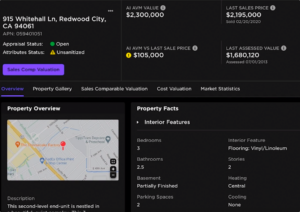
AI Property Valuation Tool Interface | Source: C3 AI
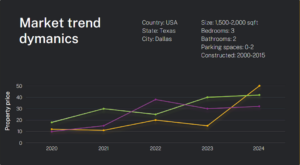
Real Estate Market Analysis in AI Property Valuation Tools
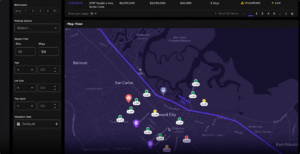
Location Search in AI Property Valuation Software | Source: C3 AI
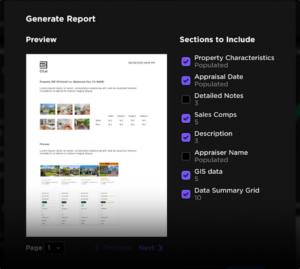
Report Generation in AI Real Estate Appraisal Tools | Source: C3 AI
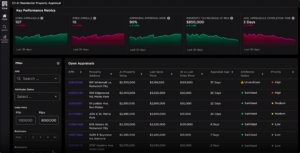
Analytics in AI Property Valuation | Source: C3 AI
Feature engineering in AI real estate appraisal is not limited to the basic functions mentioned before. Advanced techniques can further refine and augment the data:
As a technology advisor, we partner with small firms and global enterprises helping them bring automation to their operational processes in real estate.
Machine learning is a data analysis approach that automates analytical model building. ML is a part of the artificial intelligence realm, and the main point of it is that the systems can learn from data, identify typical patterns, adjust and improve, and make decisions with minimal human intervention.
In machine learning, data is the instrument, and features are the distilled essence, the key aspects that the algorithm examines to discern patterns and make predictions. In property appraisal, where stakes are high and margins thin, effective feature engineering is crucial for success.
Feature engineering involves selecting, transforming, or even creating variables from raw data that improve a model’s predictive performance. It’s not only about quantity but about the quality and relevance of the features. Properly engineered features can drastically improve a model’s accuracy, while poorly chosen or processed ones can lead it astray.
The crucial features in AI and Machine Learning property vluation are the abovementioned physical attributes, location-based features, market dynamics, environmental factors, and temporal features.
Except for the utilization of machine learning real estate valuation, AI technology has even more capabilities that could help real estate appraisers in the critical and essential process of property valuation. Some of them include the following.
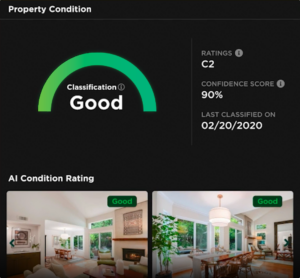
Computer Vision in AI Real Estate Appraisal | Source: C3 AI
See how AscendixTech can help you integrate AI technology in your real estate valuations.
As a trailblazer in the realm of technological advancements within the real estate industry, Ascendix has established unique expertise and significant experience in fostering transformative change in real estate.
Why choose Ascendix as your real estate partner?
How Ascendix can help in your AI real estate valuation:
The role of AI in the real estate industry is undoubtedly transforming the appraisal process. However, AI is highly unlikely to fully replace the expertise of skilled real estate appraisers. It can serve as a powerful tool to support the appraiser’s work, providing valuable data-driven insights and speeding up certain labor-intensive aspects of the appraisal process. Yet, the human element remains essential for interpreting data, considering unique property features, and making final decisions that require contextual understanding and expertise.
Using AI in real estate appraisals signifies a shift towards enhanced efficiency, accuracy, and data-driven decision-making. For appraisers, AI can streamline the appraisal process by automating tasks such as data collection, analysis, and report generation, enabling appraisers to focus more on value-added activities that require human judgment and expertise. Moreover, AI solutions can act as valuable real estate appraiser tools for providing comprehensive, real-time market data and predictive analytics to make informed and up-to-date property assessments. Overall, AI helps appraisers deliver more precise, transparent, and timely valuations, enhancing their capabilities within the real estate industry.
Artificial intelligence simplifies property valuation by automating data collection and analysis from diverse sources. Utilizing machine learning, it identifies patterns and trends in extensive datasets, offering real-time market insights and precise property assessments. AI empowers appraisers to create adaptable valuation models, significantly enhancing efficiency and accuracy throughout the valuation process.
Yana is a proptech enthusiast and a technology fan. In her articles, she explores the world of real estate software, including proptech news, useful resources, and real estate technology insights, assisting everyone involved in the industry to modernize and optimize their business.
Get our fresh posts and news about Ascendix Tech right to your inbox.